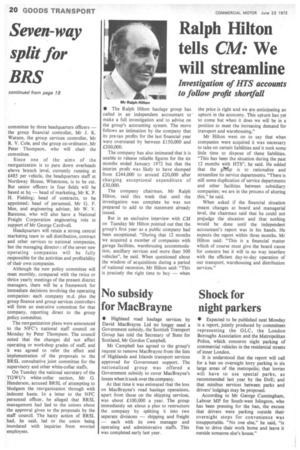No subsidy Shock for for MacBrayne night parkers
Page 22

If you've noticed an error in this article please click here to report it so we can fix it.
• Highland road haulage services by David MacBrayne Ltd no longer need a Government subsidy, the Scottish Transport Group has told the Secretary of State for Scotland, Mr Gordon Campbell.
Mr Campbell has agreed to the group's request to remove MacBrayne from the lists of Highlands and Islands transport services approved for Government support. The nationalized group was offered a Government subsidy to cover MacBrayne's losses when it took over the company.
At that time it was estimated that the loss on MacBrayne's road haulage operations, apart from those on the shipping services, was about £100,000 a year. The group immediately set about a plan to restructure the company by splitting it into two separate divisions — shipping and freight — each with its own manager and operating and administrative staffs. This was completed early last year. • Expected to be published next Monday is a report, jointly produced by committees representing the GLC, the London Boroughs Association and the Metropolitan Police, which concerns night parking of commercial vehicles in the residential streets of inner London.
It is understood that the report will call for a ban on overnight lorry parking in six large areas of the metropolis; that lorries will have to use special parks, as recommended last year by the DoE; and that minibus services between parks and drivers' lodgings may be proposed.
According to Mr George Cunningham, Labour MP for South-west Islington, who has been pressing for the ban, the excuse that drivers were parking outside their overnight stops for convenience was insupportable. "No one else," he said, "is free to drive their work home and leave it outside someone else's house."












































































































